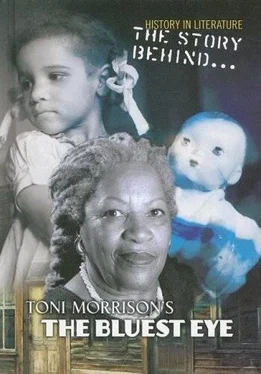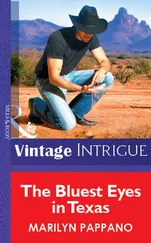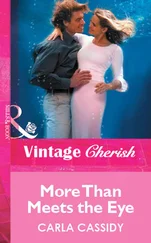Consider: How I hated and despised the money. And now, consider: Not according to my just deserts, but according to my mercy, the little black girl that came a-looning at me today. Tell me, Lord, how could you leave a lass so long so lone that she could find her way to me? How could you? I weep for you, Lord. And it is because I weep for You that I had to do your work for You. Do you know what she came for? Blue eyes. New, blue eyes, she said. Like she was buying shoes. "I'd like a pair of new blue eyes." She must have asked you for them for a very long time, and you hadn't replied. (A habit, I could have told her, a long-ago habit broken for Job-but no more.) She came to me for them. She had one of my cards. (Card enclosed.) By the way, I added the Micah-Micah Elihue Whitcomb. But I am called Soaphead Church. I cannot remember how or why I got the name. What makes one name more a person than another? Is the name the real thing, then? And the person only what his name says? Is that why to the simplest and friendliest of questions: "What is your name?" put to you by Moses, You would not say, and said instead "I am who I am." Like Popeye? I Yam What I Yam? Afraid you were, weren't you, to give out your name? Afraid they would know the name and then know you?
Then they wouldn't fear you? It's quite all right. Don't be vexed. I mean no offense. I understand. I have been a bad man too, and an unhappy man too. But someday I will die. I was always so kind. Why do I have to die? The little girls. The little girls are the only things I'll miss. Do you know that when I touched their sturdy little tits and bit them-just a little-I felt I was being friendly? I didn't want to kiss their mouths or sleep in the bed with them or take a child bride for my own. Playful, I felt, and friendly. Not like the newspapers said. Not like the people whispered. And they didn't mind at all. Not at all.
Remember how so many of them came back? No one would even try to understand that. If I'd been hurting them, would they have come back? Two of them, Doreen and Sugar Babe, they'd come together. I gave them mints, money, and they'd eat ice cream with their legs open while I played with them. It was like a party. And there wasn't nastiness, and there wasn't any filth, and there wasn't any odor, and there wasn't any groaning-just the light white laughter of little girls and me.
And there wasn't any look-any long funny look-any long funny Velma look afterward. No look that makes you feel dirty afterward. That makes you want to die. With little girls it is all clean and good and friendly. You have to understand that, Lord. You said, "Suffer little children to come unto me, and harm them not." Did you forget? Did you forget about the children?
Yes. You forgot. You let them go wanting, sit on road shoulders, crying next to their dead mothers. I've seen them charred, lame, halt. You forgot, Lord. You forgot how and when to be God. That's why I changed the little black girl's eyes for her, and I didn't touch her; not a finger did I lay on her. But I gave her those blue eyes she wanted. Not for pleasure, and not for money. I did what You did not, could not, would not do: I looked at that ugly little black girl, and I loved her. I played You. And it was a very good show! I, I have caused a miracle. I gave her the eyes.
I gave her the blue, blue, two blue eyes. Cobalt blue. A streak of it right out of your own blue heaven. No one else will see her blue eyes. But she will. And she will live happily ever after. I, I have found it meet and right so to do. Now you are jealous. You are jealous of me. You see? I, too, have created. Not aboriginally, like you, but creation is a heady wine, more for the taster than the brewer. Having therefore imbibed, as it were, of the nectar, I am not afraid of You, of Death, not even of Life, and it's all right about Velma; and it's all right about Papa; and it's all right about the Greater and the Lesser Antilles. Quite all right. Quite. With kindest regards, I remain, Your, Micah Elihue Whitcomb Soaphead Church folded the sheets of paper into three equal parts and slipped them into an envelope. Although he had no seal, he longed for sealing wax. He removed a cigar box from under the bed and rummaged about in it. There were some of his most precious things: a sliver of jade that had dislodged from a cufflink at the Chicago hotel; a gold pendant shaped like a Y with a piece of coral attached to it that had belonged to the mother he never knew; four large hairpins that Velma had left on the rim of the bathroom sink; a powder blue grosgrain ribbon from the head of a little girl named Precious Jewel; a blackened faucet head from the sink in a jail cell in Cincinnati; two marbles he had found under a bench in Morningside Park on a very fine spring day; an old Lucky Hart catalog that smelled still of nut-brown and mocha face powder, and lemon vanishing cream. Distracted by his things, he forgot what he had been looking for. The effort to recall was too great; there was a buzzing in his head, and a wash of fatigue overcame him. He closed his box, eased himself out on the bed, and slipped into an ivory sleep from which he could not hear the tiny yelps of an old lady who had come out of her candy store and found the still carcass of an old dog named Bob.
I have only to break into the tightness of a strawberry, and I see summer-its dust and lowering skies. It remains for me a season of storms. The parched days and sticky nights are undistinguished in my mind, but the storms, the violent sudden storms, both frightened and quenched me. But my memory is uncertain; I recall a summer storm in the town where we lived and imagine a summer my mother knew in 1929. There was a tornado that year, she said, that blew away half of south Lorain. I mix up her summer with my own. Biting the strawberry, thinking of storms, I see her. A slim young girl in a pink crepe dress. One hand is on her hip; the other lolls about her thigh-waiting. The wind swoops her up, high above the houses, but she is still standing, hand on hip. Smiling. The anticipation and promise in her lolling hand are not altered by the holocaust. In the summer tornado of 1929, my mother's hand is unextinguished. She is strong, smiling, and relaxed while the world falls down about her. So much for memory.
Public fact becomes private reality, and the seasons of a Midwestern town become the Moirai of our small lives. The summer was already thick when Frieda and I received our seeds. We had waited since April for the magic package containing the packets and packets of seeds we were to sell for five cents each, which would entitle us to a new bicycle. We believed it, and spent a major part of every day trooping about the town selling them.
Although Mama had restricted us to the homes of people she knew or the neighborhoods familiar to us, we knocked on all doors, and floated in and out of every house that opened to us: twelve-room houses that sheltered half as many families, smelling of grease and urine; tiny wooden four-room houses tucked into bushes near the railroad tracks; the up-over places-apartments up over fish markets, butcher shops, furniture stores, saloons, restaurants; tidy brick houses with flowered carpets and glass bowls with fluted edges. During that summer of the seed selling we thought about the money, thought about the seeds, and listened with only half an ear to what people were saying. In the houses of people who knew us we were asked to come in and sit, given cold water or lemonade; and while we sat there being refreshed, the people continued their conversations or went about their chores. Little by little we began to piece a story together, a secret, terrible, awful story.
And it was only after two or three such vaguely overheard conversations that we realized that the story was about Pecola.
Properly placed, the fragments of talk ran like this: "Did you hear about that girl?"
Читать дальше











